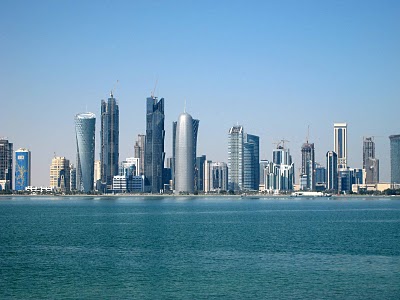Doha, Qatar: Perfect Laboratory to Study Climate Change
 The U.S. is negotiating at the United Nations Framework Convention on Climate Change meeting in Doha, Qatar, a new legally binding treaty to cap and trade greenhouse gases, primarily carbon dioxide that is emitted when fossil fuels are burned.
The U.S. is negotiating at the United Nations Framework Convention on Climate Change meeting in Doha, Qatar, a new legally binding treaty to cap and trade greenhouse gases, primarily carbon dioxide that is emitted when fossil fuels are burned.
Since 1997, the U.S. has wrestled with a proposed GHG cap of 7% below 1990 levels by 2012. The U.S. Senate never ratified that treaty called the Kyoto Protocol that expires this year. In 2009, President Obama updated the U.S. target to 17% below 2005 levels by 2020, in keeping with discussions in Doha.
Qatar is a perfect laboratory for scientists to study climate change because the three primary factors that cause climate change are solar activity, ocean currents and winds.
Qatar is a desert nation bordering Saudi Arabia, so there is plenty of intense sunlight with scorching heat reaching as high as 122 degrees from May through September with less than four inches of rain annually. It is surrounded by the Persian Gulf, so ocean currents can be observed. Violent dust storms periodically descend on the peninsula, blocking the sun and causing wind damage.
Studying climate change, however, is not the reason the UN meets annually; instead, it is to discuss the politics of climate change, which disses science in favor of a political agenda in which free market principles are replaced with redistributionist utopian ideals. It is called sustainable development, which demands social, economic and environmental “justice.”
“Justice” can be interchanged with “equity.” At last year’s UNFCCC meeting in Durban, South Africa, India tried to insert the word “equity” in the conference document. China, India, Saudi Arabia, Sudan, Egypt, Thailand, Malaysia, Argentina, about 40 countries in all, joined India’s failed effort. We can expect much debate in Qatar to revolve around “equity.”
At the 2012 UNFCCC’s opening on Monday, former Qatari oil minister Abdullah Bin Hamad al-Attiyah tried to deflect the criticism that his nation is the world’s largest per capita GHG emitter stating, "We should not concentrate on the per capita [emissions]. We should concentrate on the amount from each country."
The oil minister’s statement essentially redirected the critics to sustainable development’s call for “equity.” Is this what you would expect from an ally that hosts the U.S. Central Command’s Forward Headquarters and Combined Air Operations Center? So goes the merry-go-round of climate change negotiations.
Jonathan Pershing, the American negotiator this first week, claims that America deserves more credit for “enormous” efforts. Indeed, President Obama has thrown billions of taxpayer dollars to not only Solyndra, but to more than a dozen solar companies that went bankrupt last year. It is “enormous” too that a new CAFE standard of 35 miles per gallon by 2016 was set in 2008, when the auto industry was in a compliant mood after a $50 billion government bailout. The asphyxiating 54.5 miles per gallon by 2025 will “enormously” affect our families’ safety too.
In spite of global temperatures falling for the past two years, it remains to be seen if cooler heads will prevail in Qatar or whether environmental and redistributionist zealots will agree to a new legally binding treaty to replace the Kyoto Protocol.




Comments
Facebook Comments
Make sure to check out the comments on Facebook.